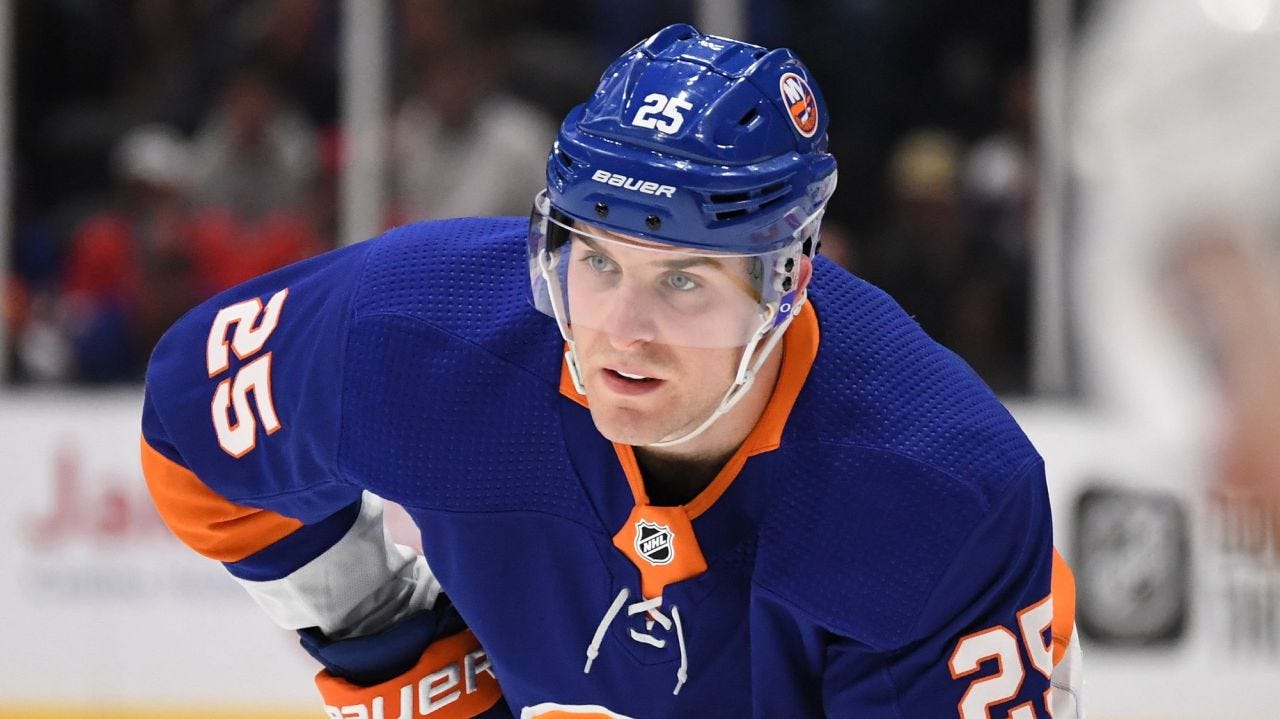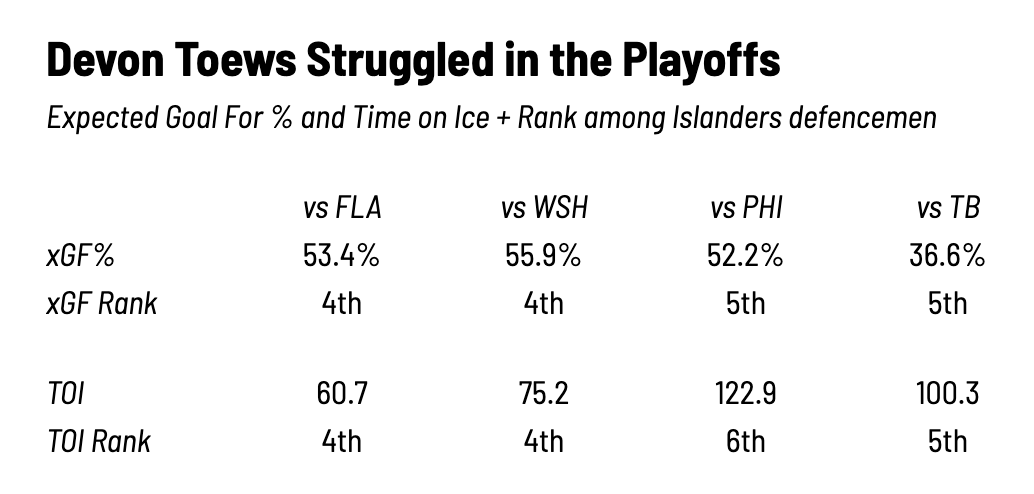Who is Devon Toews, and Why Does the Analytics Community Like Him So Much?
Breaking down the Avs' new acquisition.

When the Avalanche acquired 26 year old sophomore defenceman Devon Toews in a trade last week, many hockey fans were confused not only by the fact that a player they had never heard of returned two 2nd round picks but that the analytics community reacted like it was the Hall for Larsson trade all over again. More than a few Islanders fans were especially irritated that their team was getting dunked on for moving their #4 defenceman who they just watched get caved in by the Lightning. All told, Toews’ low profile across the league, especially compared to his sterling underlying numbers, creates a pretty huge disconnect between the analytically savvy who adore him and those who kinda remember him from the playoffs.
So who is Devon Toews, and why does the analytical community like him so much? And what happened in the playoffs that made many Islanders fans fine with seeing him go?
Devon Toews: Analytical Darling

(Edited portrait by @NHLPortrait)
Devon Toews is a top four two-way defenceman who has put up pretty absurd macro-level results in his first two seasons in the NHL. His isolated impact on scoring chances for and against, measured by EvolvingWild’s RAPM model, ranks 5th in the NHL in the past two years combined, which has caused a whole lot of excitement among those in the analytics community. That this impact is mirrored by microstats (manually tracked by Corey Sznajder) makes the prospect of his addition to the Avalanche even more intruiging:

The best way to describe Toews is that he is a puck moving defenceman through and through. His transition stats stand out on a pretty conservative Islanders team, and his ability and willingness to break the puck out and carry it into the offensive zone ranks among the league’s elite. Once in the offensive zone, he’s a very strong playmaker - his primary shot assist rates rank only behind players like John Klingberg, Erik Karlsson, and his future teammate Cale Makar among blueliners. Despite his high shot contributions and scoring chance driving stats, Toews doesn’t shoot the puck much at all; in each of the past two seasons he ranked 5th among Isles defencemen in his personal share of his team’s on-ice shot attempts (18% in both), especially restrained considering that his teammates were three of the league’s top 20 in that regard. Unlike many flashy transition defencemen, Toews has the hockey IQ to get things done in the offensive zone without just throwing pucks on net. As former Marlies assistant coach Jack Han put it in his own breakdown of Toews:
Offensively Toews makes quick, simple continuation plays on retrievals, then sprints the middle of the ice to join the rush. In the OZ he waits for F3 to curl high, then plays give-and-go with him instead of forcing low-percentage shots at net.
Toews is also strong at defending his blueline off the rush. Despite the Islanders being a relatively conservative team when it comes to trying to disrupt zone entries, Toews ranked first on the team in denial percentage (12%) and allowed the lowest rate of clean entries (51%) this season. While aggressive play at the line can be risky, there’s nothing to suggest that there were major consequences for this decisionmaking in the regular season; in fact, it forced opposing forwards to dump the puck in rather than carry it, and he was 90th percentile among defencemen this year in terms of denying possession entries. On this, Han says:
Defensively he uses his high-end skating to help Mayfield deny the line and force dump-ins, then plays more passively in-zone while his teammates pressure and recover the puck. NYI’s 1-1-3 NZ FC and Five-Tight DZ Coverage reduces his need to win one-on-one battles.
While Toews isn’t incredibly active in the defensive zone, he did rank 2nd among Isles defencemen in takeaways per 60 minutes at 5v5, and his defensive zone turnover rate (2.1 per 60) was lower than most Islanders defencemen and significantly lower than his partner Scott Mayfield. He’s not a physical defenceman in any meaningful sense and prefers to use his stick to make plays in his own end. Here’s Jack’s compilation of the types of small plays that add up to build Toews’ elite results:
Toews spends more time on the ice with Mathew Barzal than any other forward, but there’s little reason to believe his results are driven by his elite centreman; in fact, his expected goal for percentage has actually been higher away from Barzal than with him (55.6% vs. 52.4%). There’s also nothing to suggest that an increased ice time load is a problem for him, as his on-ice numbers were not negatively affected by playing more minutes:

Additionally, per PuckIQ he played better against top competition than any Islanders defenceman by a wide margin, putting up a 48.8% shot share compared to second place Adam Pelech’s 44%.
Overall, Devon Toews does not play the dynamic game of a Roman Josi type, but he’s an excellent facilitator of offence and a capable defensive player who can make smart plays to move the puck out of his zone. He’s a strong skater, an intelligent defender, a confident puck carrier, and a effective passer. That he’s been able to maintain high-end numbers in both of his seasons so far is extremely impressive, and he has demonstrated at least that he is one of the top second-pairing defencemen in the league.
What Happened in the Playoffs, and What Does it Mean?
Toews undoubtedly was not his best in the 2020 playoffs. After finishing first in xGF% among Islanders defencemen in the 2018-19 regular season, the 2019 playoffs, and the 2019-20 regular season, he ranked a dismal 6th in the bubble, and was never better than the #4 defenceman he was deployed as.

Toews was on the ice for a 5v5 goal against in each of the Islanders’ six games against the Lightning and was particularly poor in game seven, when he was totally caved in.
Looking at his playoff microstats, it’s clear that his effectiveness was diminished almost across the board, particularly in terms of zone entries and entry denials:

I wonder whether the tightening of the Trotz system in the playoffs might have contributed to some stunting of some of the things Toews does best. His shot creation was relatively unaffected, but outside of the offensive zone there were major issues. Digging into his opponents, Toews struggled the most against the Anthony Cirelli line in terms of scoring chances and the Blake Coleman line in terms of goals against. As I wrote about during the finals, both of these units played relentless “dump and retrieve” styles that victimized opposing defencemen by overwhelming them with speed and pressure. Because Trotz kept the Toews pair away from the much more puck control oriented Brayden Point line (in six games Toews only spent 9:10 on the ice against Point versus 34:40 against Yanni Gourde), he exposed him to a scheme that was practically devised to exploit his weaknesses - he actually performed better in a small sample against the top line than against the third line. Watching him play against the Lightning, it’s evident that he frequently forced the dump-in but along with Mayfield was often unable to prevent the Bolts from retrieving the puck or at least engaging in a time-consuming puck battle.
This had downstream effects on other elements of his game. As Jack points out, the below play is a common one for him and a major reason he racks up zone entries:

Toews’ zone exit and entry numbers dropped hard in the series against the Lightning in part because forechecking pressure prevented his partner (whether it was Mayfield or especially Boychuk) or his forwards from cleanly making that pass. Meanwhile the swarm limited his own ability to create in his zone and break the puck out himself.
I don’t think it’s fair to dismiss Toews’ body of work based on a limited set of games in exceptional circumstances, especially considering his prior consistent track record of success (including in the 2019 postseason). There are a million possible reasons why his game slipped in the bubble that have nothing to do with underlying skill. That being said, his dismal performance shouldn’t be totally ignored either, and Toews and the Avalanche should both learn from the Lightning series to solidify his game further in a copycat league that paid plenty of attention to how the Bolts won.
Conclusion
It’s unfortunate for the Islanders that they had to give up on Devon Toews, even though they got some decent assets in return. Under normal circumstances, he is the type of player that you want to keep around for a long time, particularly in an organization with limited proven puck-moving talent on hand. There will be a lot of pressure on Nick Leddy and particularly young Noah Dobson to drive offence from the back-end and create from the point in Toews’ absence. I understand why Islanders fans, who have only seen mediocre-to-poor hockey from Toews in the past eight months, are bewildered by the sudden outpouring of affection for him from the analytics community - especially considering the eternal confusion of what “defence” actually means. On a team with plenty of more traditional defensive defencemen (like Adam Pelech and Ryan Pulock) I can’t imagine that the possession-oriented Toews registered as a top defensive threat to their eye test.
I’m intruiged how Toews will fit with Colorado and where he’ll play. The Avs are by far the most possession-heavy transition team in the NHL, leading the league in both possession entries and exits last season. Compare that to the Islanders, who ranked well below-average in both categories. In theory, this should be a match made in heaven. On the other hand, he is far from the only puckmover on that blueline, and joins a left side with Sam Girard and Ryan Graves already established. While I think he’s better than both of those players, the Avs might be content to not mess with what worked when it comes to their top two pairings, in which case he would probably start on the third pairing with Ian Cole. I like a Cole a lot, and because his microstats are very similar to Scott Mayfield’s I could see the two fitting very well together. That said, I hope Toews has a chance to challenge for a top four or even top pairing role in Colorado. While the Avalanche are a deep team, his abilities as a facilitator will be most effective playing with talent that he can activate using those A unit with both Toews and Brandon Saad on the ice together might never spend a second outside the offensive zone. He’s shown with the Isles that the more minutes and responsibility he’s given, the better he plays.
So can Devon Toews break out, freed of the constraints of the Trotz system? Or was that system the safety net that allowed him to thrive in Long Island? As if we needed another reason to watch the Avalanche next season.




I think we can say we like Devon as a person but what he did in the playoffs was not cool ..he cost us specific games by making horrible plays at the blue line we can't do that in the playoffs . even game 6 in overtime that we lost to Tampa Bay when we lost the series it was his poor coverage on that goal. It began to be clear that Tampa Bay was purposely targeting his poor defensive play